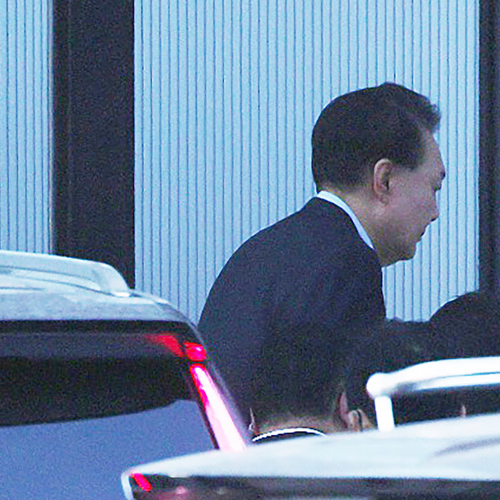In a dramatic turn of events, South Korea’s impeached President Yoon Suk Yeol was detained by law enforcement in a massive operation at the presidential compound in Seoul. Yoon had been under heavy scrutiny for weeks, especially after he declared martial law in December, which sparked controversy and led to calls for his removal from office. On the morning of his detainment, a large team of investigators and police officers stormed the compound after hours of tense confrontation with presidential security forces.
Yoon, who had been holed up in his residence for weeks, was defiant during the operation. In a video message released before his arrest, he claimed that the anti-corruption agency leading the investigation had no legal authority to examine his actions. Despite this, he complied with the law enforcement operation, stating that it was to prevent violence and bloodshed. His message expressed deep frustration, claiming that the rule of law had completely broken down in South Korea.
A High-Stakes Investigation and Standoff
The investigation into Yoon’s actions centers on his decision to declare martial law on December 3. His declaration involved deploying military troops around the National Assembly in a bid to control the opposition’s efforts to block his agenda. The martial law was short-lived, only lasting a few hours before lawmakers voted to lift the measure. However, it was enough to spark outrage and calls for his impeachment.
South Korea’s Martial Law Sparks Unrest and Criticism from North Korea
On December 14, South Korea’s parliament voted to impeach Yoon on charges of rebellion and misconduct related to his martial law decision. With the impeachment underway, Yoon’s powers were suspended. The case now rests with the Constitutional Court, which will decide whether to formally remove him from office or reinstate him.
The Law Enforcement Operation
The operation to arrest Yoon began early in the morning with a standoff between police officers and the presidential security service at the compound’s gates. Presidential guards had fortified the area with barbed wire and rows of buses to block investigators from entering. Despite these obstacles, investigators and police officers eventually breached the compound and moved toward Yoon’s residential building.
Yoon was escorted from the compound in a convoy of black SUVs, some of which had sirens blaring, signaling the high tension of the operation. After being detained, he was taken to the headquarters of the anti-corruption agency in Gwacheon, a city near Seoul. There, he was questioned for several hours before being transferred to a detention center.
Legal Challenges and Controversies Surrounding Detention
The law enforcement effort to detain Yoon faced numerous legal challenges. Yoon’s lawyers argued that the detainment warrant issued by the Seoul Western District Court was invalid. They claimed that the anti-corruption agency did not have the legal authority to investigate Yoon for rebellion. They also pointed to a law that protects locations tied to military secrets, claiming that his residence could not be searched without his consent.
Suspended South Korean President Resists Arrest: A Nation in Political Crisis
Yoon himself strongly opposed the operation. In his video message, he accused the authorities of conducting illegal actions under an invalid warrant. He stated that his compliance with the detainment was not an admission of guilt, but rather an attempt to avoid further violence.
Next Steps in the Investigation
Despite the controversy, the investigation moves forward. If the anti-corruption agency can present enough evidence, it has 48 hours to request a court order to formally arrest Yoon on rebellion charges. If the court grants the arrest, his detention could be extended for up to 20 days. If the request is denied, he will be released.
Yoon’s impeachment has already caused major divisions in South Korea. His supporters rallied in the streets, decrying the investigation and calling for his release. Meanwhile, critics of his actions celebrated his detainment, believing it to be a step toward restoring constitutional order and the rule of law in the country.
With the investigation now in full swing, tensions remain high in Seoul, with thousands of police officers monitoring protests and ensuring that there are no violent confrontations. As the country waits for further developments, the battle over Yoon’s future continues to unfold.


